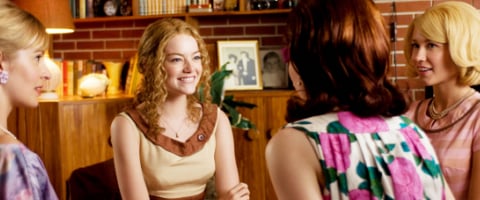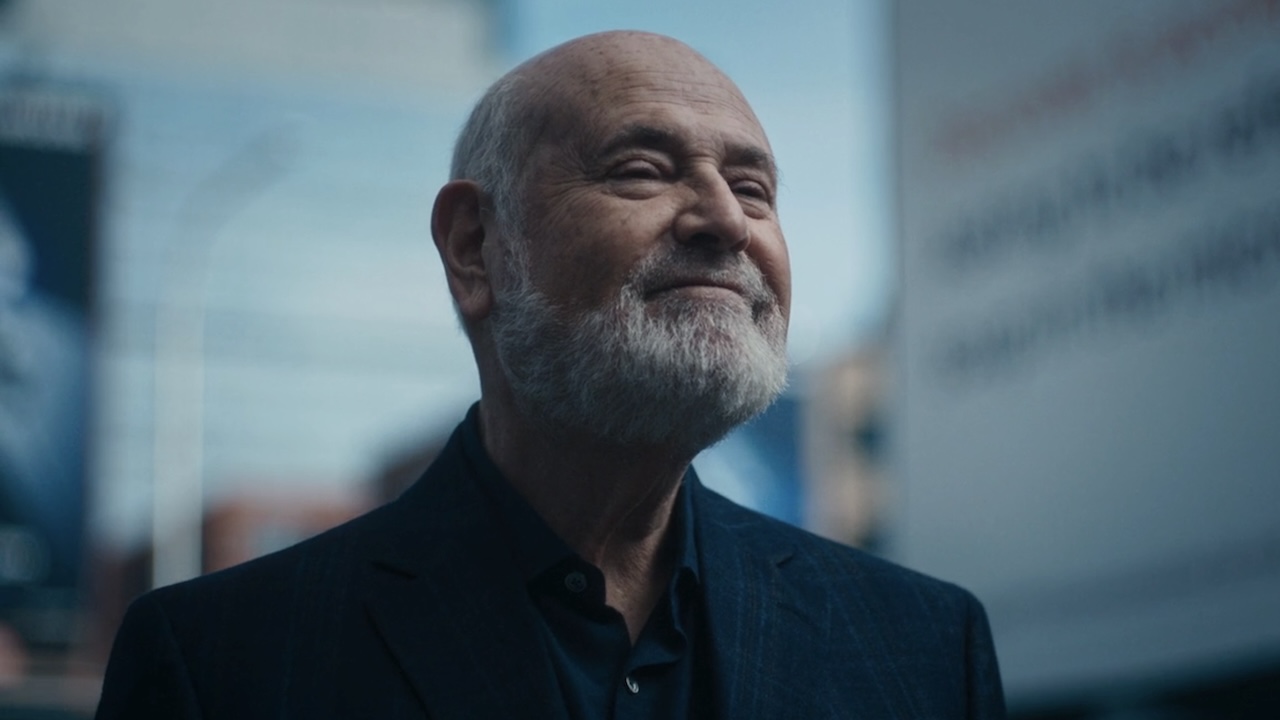Cinema Con: The Help Brings History, Humor, And Female Strength To Summer Movie Season

I was a little biased in my anticipation for The Help during the DreamWorks presentation at Cinema Con yesterday. Not only had I visited the set in sweltering Mississippi summer heat (more on that later this year), but I had read the best-selling Kathryn Stockett novel on which it was based, thanks to a recommendation from my mother who had since sent it on to all of her friends. The Help is already a phenomenon in the literary world, and the movie with a dynamite cast and a director who grew up with the author seemed to have everything going with it to be great.
Obviously a sizzle reel of clips and behind-the-scenes footage cut together for an industry convention is no demonstration of whether the movie is good or bad, but I wasn't the only one impressed by what we saw from The Help. Emma Stone stars in the film as Skeeter Phelan, a 22-year-old returning from college to her Mississippi hometown in 1963 while she tries to start her career as a journalist. When challenged to write about something that makes her uncomfortable, she turns her sight to the lives of the African-American women who work as "the help" in the homes of her town's wealthy white people, including Skeeter's childhood best friend Hilly Holbrook (Bryce Dallas Howard). Skeeter enlists two of these women in particular, played by Viola Davis and Octavia Spencer, to help her write a book that exposes what their lives are really like-- all of this at the very beginning of the Civil Rights Movement.
The reel they cut together for the presentation focused a lot of the drama-- lots of tears, lots of hints at the civil rights importance of what Skeeter does, and some beautiful photography of small-town Mississippi where they shot the movie. But when they took the stage the four stars emphasized the film's comedy, something that probably will be unavoidable with comedic talents like Stone, Spencer and even Allison Janney in the cast. More than anything the clips we saw seemed to carry the feel of the deep South in midsummer-- the lush greenery, the incredible humidity, even the sight of sweat on the faces of the actresses, who were also layered down in period clothing, wigs and at least one remarkably lacquered hairdo.
I caught up with the four leads after the presentation for a quick interview and asked them about that sweat-- Howard, for one, did not hesitate to talk about exactly what kind of sweat you'll be seeing in the film. We also talked about what we can expect from the movie-- the actresses all saw it earlier this week-- the resonant truths they see in the film, and which of their co-stars they expect to totally steal the film out from under them. I also talked to director Tate Taylor and producers Brunson Green and Chris Columbus on the red carpet, asking them how they'll sell a movie starring all women as a summer film (yes, the video is terrible, but it's quick and the audio is at least worth hearing). Check out that and the transcript of my conversation with the leads all below. The Help opens August 12; in the meantime do yourself a favor and read Kathryn Stockett's book so we can all be excited for this one together.
It seems like all the sweat you guys put into working on this movie on location in Mississippi is really showing up on the screen.
Emma Stone: Literally. There's so much sweat in the movie.
Your Daily Blend of Entertainment News
Bryce Dallas Howard: Crotch sweat.
Viola Davis: Underarm.
Does it feel a little bit weird to show up at Cinema Con amid all the bigger 3D summer movies, going "Please, enjoy our classy literary adaptation with social themes?" Did that feel like a disconnect?
Viola Davis: No, it makes us feel special.
Bryce Dallas Howard: There was some quote that I read somewhere [from Chekhov], where enormous things can happen in a living room. In the past, films like this were these event movies. I hope Tate didn't take it take it as an insult the first time I started seeing some footage -- I'm like, "You made a '90s movie!" It's one of those films that are incredibly powerful and heartwarming, but very true. You can watch them over and over and over again, because they take you through this journey.
Emma Stone: This movie is visually stunning. If you're looking for visually stunning, Stephen Goldblatt was the DP and Tate has an incredible eye. It's a beautiful movie. Even if you're into 3D, this will still be --
Octavia Spencer: It will feel satisfying.
Viola Davis: I also think those are the movies we can quote from. Hopefully they will be quoting Skeeter, Aibileen, Minny lines 10 years from now. Bryce Dallas Howard: No one will ever say anything that Hilly Holbrook ever says again. [Note: Hilly, a stuck-up and racist socialite, is something like the villain of the movie] Viola Davis: Yes they will. They will, they will: trust me, they will.
Saying this is a 90s movie-- do you feel like it is a throwback in doing things that major studios don't bother to do anymore?
Emma Stone: Isn't it a shame that you say that?
Bryce Dallas Howard: My dad saw the film with all of us on Sunday. That's something he was really struck by, because those are the kinds of movies he wants to make and platformed his career, in a way. He wrote Stacy [Snider, chair of Dreamworks] being like, "You made one of them. How'd you do that?" She was his boss over at Universal, when she was over at Universal. She wrote back saying, "Whenever I hear about a certain genre being dead, I laugh. It's ridiculous. This is storytelling. Who's to say what's the more successful genre of storytelling? You need to do it really, really well." I think to do this kind of movie well takes a lot of effort, and I think you can in some ways justify a considerable amount of effort when you're building something that's technologically groundbreaking. When you're having trouble with a script, or when you're having trouble with working a scene, people maybe prematurely give up, and nobody gave up on this film. There were so many incredible minds behind this process, and there was so much support that I'm really excited that there is a film that can represent that and is being sold as that in a way that I think is very successful.
Emma Stone: I was wondering if it's modern culture, and the fact that kids' schools are being changed to pass/fail and why people don't want to work as hard to make something that really is --
Viola Davis: Everything is quick.
Emma Stone: There is quick and not earned as much anymore.
Viola Davis: And what I've realized, even watching plays and movies, is the biggest issue is people don't trust the story. People don't trust a good story. Actors don't trust a good story sometimes. They don't trust a good character. They all resort to gimmicks and gadgets -- anything to distract you from the fact that they don't really want to go there. I think it takes an extraordinary amount of courage for an actor to delve into truth, and it takes an extraordinary amount of courage for a filmmaker to say, "You know what, let me tell you a really great story. Let me take my time telling it. Let me cast the people in it that will tell it the best. I will trust that you will keep your butts in the seats." That's what this film does, and it makes me feel special to be a part of it, because I think it's going to last through time.
What would you to say some hypothetical moviegoer who wouldn't want to see this movie because it's set in the 60s?
Octavia Spencer: Because if you don't know history, you're destined to repeat it. The truth of the matter is, it is what's happening in the rest of the world. This is what I say to my nieces and nephews:My mother made sure we knew history. I knew history, but I really didn't appreciate it until I had to walk in these shoes. That is the difference: you have to understand what people went through just to make this passé, the fact that they don't need to care, quote-unquote. I think if you don't understand the contributions that other people made -- whether it's through film, whether it's through literary work -- you have to understand what people contributed in order to really appreciate that contribution. I do understand, now.
Viola Davis: King says, "If you feel like you have no stake in a culture, you will just destroy it." We take for granted that we're sitting next to black people, Hispanic people in class. We take for granted we can even get an education. We don't know the people who died to get our behinds in a classroom.
Emma Stone: To be sitting here right now.
And films like this can make that difference between past and present even more obvious.
Bryce Dallas Howard: In a very entertaining way. That's the thing that's very distinctive, I think, about this particular genre of filmmaking: it's not grueling. You're not watching miserable people living their miserable lives in Miserabletown, USA. These are people who are really trying, it's hilarious, it's emotional. It's all the things you would want out of an escapist experience, but it's actually connecting you back into what is true. That's what's good about it.
Octavia Spencer: You always go back to those people that are the luminaries, and Ron Howard and Steven Spielberg. They still say, "I wanna be Steven Spielberg. I want to be Ron Howard," because those are the movies that move them.
Since you've seen the movie, which of your co-stars are going to steal the movie out from under you?
Octavia Spencer: Every last one of them.
Bryce Dallas Howard: Sissy, Jessica Chastain.. It's unreal what she does. And Ahna O'Reilly is beautiful.
Octavia Spencer: Mary Steenburgen, Chris Lowell, Aunjanue Ellis. Let me tell you, my very first day working with Sissy, who is an idol -- my call time was 11 o'clock, and I went to bed at 6 PM the night before, like, "I got to calm myself down." Same thing with Viola, I'm like, "I got to calm myself down. I'm working with these people." You're going to enjoy the performances.
Staff Writer at CinemaBlend

